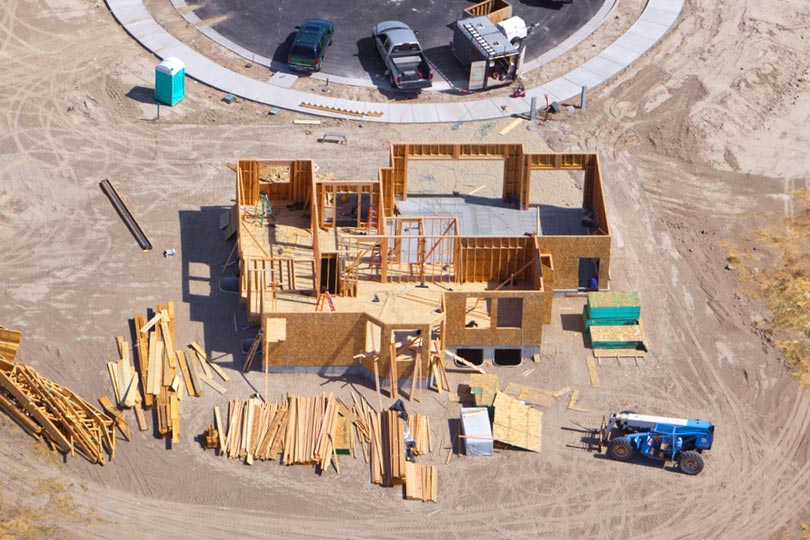Why Construction Loans Are Different

Aside from the obvious aspects, such as needing to own or buy a plot of land to build on and hiring contractors to do the work to build the property, how do single-close construction loans differ?
Timing
One of the basic perks of buying an existing home is the ability to move in as soon as conditions permit. When the previous owner is willing to surrender the keys, you can start planning the movers and your journey from the old home to the new one.
But that’s not the only timing issue to be aware of. It’s true that you’ll have to wait out the construction process before you can enjoy your new home. It’s also true that you may not be making mortgage payments right away when building on your own lot.
Will your lender ask you to make interest-only payments during the construction phase? Will they ask you to start paying once the project is complete? Do you know how your loan term is affected under such an arrangement?
Details Matter
Depending on the lender and the nature of your transaction (conventional loan, FHA, VA), your full mortgage payments may not become due until the construction phase ends.
But that may mean your 30 or 15-year loan term “clock” began ticking once the project began. You may still owe the total amount of the loan (over time) within the original term of the loan no matter when your actual payments begin.
Will you face a balloon payment at the end of the loan term because of this? Ask your loan officer about how the delayed start of your mortgage payment will affect your final payments on the mortgage.
Other Differences
Construction loans require an escrow account because, unlike an existing construction home loan, the loan funds won’t be used up all at once. Your contractors will be paid in “draws” that dole out loan funds as needed but on a strictly controlled basis.
You may find that construction loan rates trend higher than existing construction loans. This is to be expected for a variety of factors, including the lender’s risk.
Well-qualified applicants won’t have to worry much about being charged a higher-than-typical rate due to FICO score issues or other credit problems but they do have to contend with a slightly higher rate (depending on circumstances) due to the nature of the loan.
One other important difference to know? Down payments are typically higher for construction loans. It pays to save early.
Want More Information About One-Time Close Loans?
We have extensively researched the FHA (Federal Housing Administration) and the VA (Department of Veterans Affairs) One-Time Close Construction loan programs.
We have spoken directly to licensed lenders that originate these residential loan types in most states, and each company has supplied us with the guidelines for their products. We can connect you with mortgage loan officers who work for lenders who know the product well and consistently provide quality service.
If you are interested in being contacted by a licensed lender in your area, please send responses to the questions below. All information is treated confidentially.
OneTimeClose.com provides information and connects consumers to qualified One-Time Close lenders to raise awareness about this loan product and to help consumers receive higher-quality service.
We are not paid for endorsing or recommending the lenders or loan originators and do not otherwise benefit from doing so. Consumers should shop for mortgage services and compare their options before agreeing to proceed.
Please note that investor guidelines for the FHA and VA One-Time Close Construction Program only allow for single-family dwellings (1 unit) – and NOT for multi-family units (no duplexes, triplexes or fourplexes).
In addition, the following homes/building styles are not allowed under these programs: Kit Homes, Barndominiums, Log Cabin Homes, Shipping Container Homes, Stilt Homes, Solar (only) or Wind Powered (only) Homes.
Contact Us: Send Us Your Request – Spam Safe - FHA / VA One-Time Close
Please send your email request to [email protected] which authorizes OneTimeClose.com to share your personal information with one mortgage lender licensed in your area to contact you.
1. Send your first and last name, e-mail address, and contact telephone number.
2. Tell us the city and state of the proposed property.
3. Tell us your and/or the Co-borrower’s credit profile: Excellent – (680+), Good - (640-679), Fair – (620-639), or Poor- (Below 620). 620 is the minimum qualifying credit score for this product.
4. Are you or your spouse (Co-borrower) eligible veterans? If either of you is an eligible veteran, down payments as low as $0 may be available up to the maximum amount your debt-to-income ratio per VA will allow – there are no maximum loan amounts as per VA guidelines.
Most VA lenders will go up to $1,500,000 and review higher loan amounts on a case-by-case basis. If not, the FHA down payment is 3.5% up to the maximum FHA lending limit for your county.
Do you know what's on your credit report?
Learn what your score means.

July 26, 2024The Federal Housing Administration (FHA) offers qualifying borrowers the option to build a home from the ground up using a Single Close FHA Construction Loan. This program, also known as a One-Time Close construction mortgage, allows borrowers to finance the construction of a new home and convert it into a permanent mortgage with just one closing, streamlining the often complex process of building a house.
July 19, 2024VA One-Time Close construction loans help qualifying veterans build homes they will own and occupy once the construction phase is complete. One-time close loans, or construction-to-permanent loans, combine construction and permanent financing into a single closing procedure. VA One-Time Close mortgages have no VA-required down payment or mortgage insurance, making them attractive options for qualifying borrowers.
July 12, 2024When planning a construction loan, you have many options. For example, do you want to buy land with a loan to build the house? Or do you already own a parcel suitable for the construction project? There are many other choices to make with home loans, but some don’t necessarily apply to construction mortgages.








